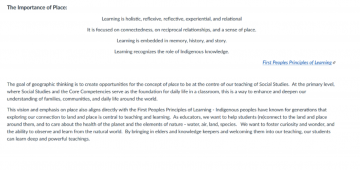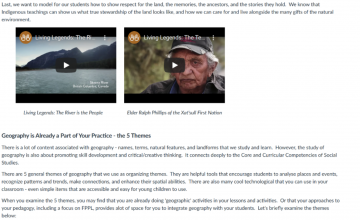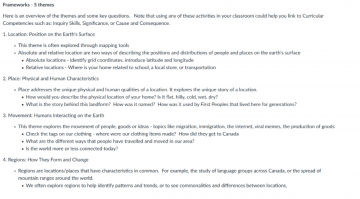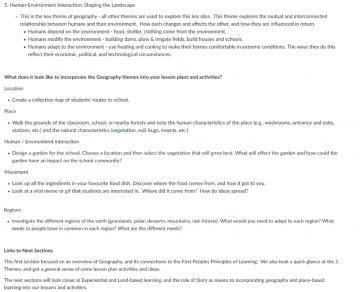Department:
Department of Curriculum & Pedagogy
Project lead(s):
Dr. Andrea Webb
Project members:
Alana Sawatsky
Reflection:
What led you to your project/inspired your work?
What values and principles guided the development of your project? I have been teaching the methodologies in Social Studies courses for over ten years. When I started working as the Area Coordinator in Social Studies(2016), I began investigations and curriculum redesign in the EDCP curriculum and pedagogy courses (EDCP 332A Social Studies –Secondary: Curriculum & Pedagogy and EDCP 331 Social Studies –Elementary: Curriculum & Pedagogy). When the opportunity arose to redesign the EDCP 331 for the NITEP cohort, I was excited to work with the instructor, Alana Sawatsky, to design an online course that was designed to specifically meet the needs of this cohort. The values and principles that underpinned this course design included: acknowledging the learners’ expertise in their own learning, reciprocity–learning with each other and from each other, and supporting learners in preparation for the challenges of the school system.
What have you learned from the process?
What reflections from the process would you like to share? For the last 10 years or so, I have taught EDCP 331 –each time trying to reflect and honour the theme of the individual cohort (early primary, social-emotional learning, etc). With this cohort, the instructor and I felt it was important to include the cohort members in the creation of the materials, often building on their areas of strength while also building up some of the areas that they needed support. So, the shell that I started with is quite different from the end product. The collaboration between me and Alana, and then her collaboration with the cohort members meant that the course shell was almost constantly being added to and a number of pieces dropped. Some of the topics received a more surface engagement as there wasn’t time to do a deep dive. In the end, this is a different course than what the students on campus might get, but I feel that there are aspects of this course that are, and should be, unique to this cohort.
Ultimately, the course does not have the breadth of some of the on-campus courses, which are between 6 and 13 weeks and have the luxury of a slower evolution of the course content often with more face-to-face time. The constraints of teaching on Zoom, including the physical demands of being on the computer all day, did make it challenging. However, this course does offer a more place-based, and personally relevant course because the instructor continued to tailor the course to the needs of the learners.
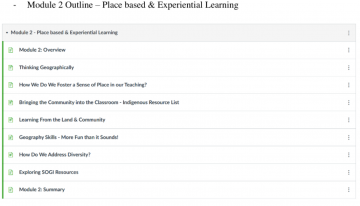 What impact/influence have you or do you see your project making?
What impact/influence have you or do you see your project making?
I see an opportunity for tremendous impact on the teaching of EDCP 331 across all 10 sections my role as there Coordinator for Social Studies, I will be sharing what we have done and learned through this cohort, with the other instructors of EDCP 331 (which is usually 4-5 each year). From the shell that I created, Alana continued to edit and change throughout the course in response to her reflections on the implementation and feedback from the cohort. Moving forward, I am encouraging EDCP 331 instructors to have even more communication with the cohort coordinators they can align with the topics, themes, and values of the cohort. This course has a strong emphasis on place-based and experiential learning –areas that are often less emphasized in the on-campus sections to the course –especially the idea of learning from the land and the community. I am encouraging all of the EDCP 331 instructors to consider how they are building in activities that get learners out of the classroom and onto the land, whether that is in an intercity school or a rural community.
Additional Material:

